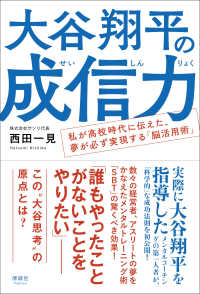- ホーム
- > 洋書
- > ドイツ書
- > Humanities, Arts & Music
- > History
- > general surveys & lexicons
Full Description
This collection explores how Christian individuals and institutions whether Churches, church-related organisations, clergy, or lay thinkers combined the topics of faith and national identity in twentieth-century Europe. National identity is understood in a broad sense that includes discourses of citizenship, narratives of cultural or linguistic belonging, or attributions of distinct, national characteristics. The collection addresses Catholic, Protestant, and Orthodox perspectives, considers various geographical contexts, and takes into account processes of cross-national exchange and transfer. It shows how national and denominational identities were often mutually constitutive, at times leading to a strongly exclusionary stance against other national or religious groups. In different circumstances, religiously minded thinkers critiqued nationalism, emphasising the universalist strains of their faith, with varying degrees of success. Moreover, throughout the century, and especially since 1945, both church officials and lay Christians have had to come to terms with the relationship between their national and European identities and have sought to position themselves within the processes of Europeanisation. Various contexts for the negotiation of faith and nation are addressed: media debates, domestic and international political arenas, inner-denominational and ecumenical movements, church organisations, cosmopolitan intellectual networks and the ideas of individual thinkers.







